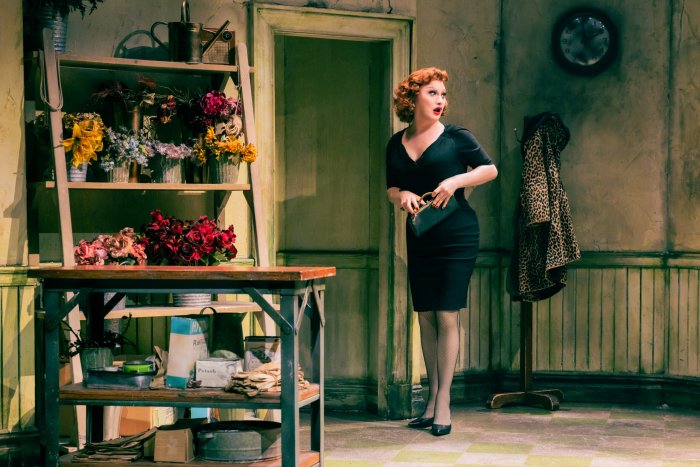In “Grace,” the acclaimed London import now making its US premiere at the Lucille Lortel Theater, religion is a prickly conundrum. And playwrights Mick Gordon and AC Grayling underscore this point straightaway by naming the main character, an ardent atheist and natural science professor, Grace, which, among its myriad definitions, means “touched by God.”
And what a perfect title for an imperfect yet stimulating play, which attacks the age-old “Does God exist?” question with renewed zeal. The drama is a dizzying, sublime concoction of contradictions, but be warned, you'd best pay close attention or you'll be lost.
GRACE
Lucille Lortel Theatre
121 Christopher St. at near Bedford
Tue.-Wed. at 7 p.m.; Thu.-Sat. at 8 p.m.;
Sat. 2 p.m.; Sun. 3 p.m.
Through Mar. 8
$60; 212-279-4200
The play opens, curiously enough, with Grace Friedman (the divine Lynn Redgrave, who's racked up nominations for three Tony Awards, two Oscars, two Emmys, and even a Grammy) blindfolded in a chair wearing an electrode-studded motorcycle-like helmet designed to stimulate the lobe of the brain that elicits spiritual sensations. A pragmatist with no use for God, she must resort to science to mimic epiphany. Quite sad, really.
Lynn Redgrave as an atheist who freaks when her son finds God.
Not long afterwards, her exuberant son, Tom (Oscar Isaac), a ponytail-wearing civil rights lawyer, announces that, after much soul searching, he's chucking a career that's “about proof, not truth,” to become an Episcopalian priest. The entire family dynamic is thrown into a tailspin.
Grace, not surprisingly, has a series of highly vocal conniptions. Tom's girlfriend Ruth (K.K. Moggie), who's just learned she's pregnant, wonders if his love of God will obfuscate their love for each other. His father, Tony (Philip Goodwin), a namby-pamby intellectual who happens to be Jewish, accepts his son's decision without qualm.
To be sure, we've heard Grace's rails against organized religion before – like how it gives extremists a special license to slaughter innocent non-believers, guilt-free. And how “intelligent design” is an absurd compromise between creationism and natural selection. Yet, in this insightful, sharply written production, the issues feel as profoundly urgent as ever.
To liven things up even more, the authors inject a few winking cultural references, such as “Alice in Wonderland,” the films “The Matrix” and “The Sixth Sense,” and the club drug, ecstasy (Tom fondly remembers the time he slipped a crushed tab in his father's curry). The play suggests that these are alternate, albeit fleeting, vehicles for spiritual fulfillment.
As if the ideas aren't enough to wrestle with, the plot is laid out in jump-cut fashion, forcing us to decipher the chronology. Out of nowhere, we witness Grace delivering a lecture, or Tom delivering a sermon. Somewhere along the way it dawns on us — is the whole shebang simply a haunting figment of Grace's electronic neural stimulation?
The tragic twist near the end, which I won't give away here, is straight out of a Hollywood movie, yet comes across as more perplexing than revelatory.
Although the 90-minute play moves along at a decent clip, I confess I could've used an intermission, if only for the chance to exchange theories with my companion as to what might be going on.
“Grace” aspires to be as potent and enthralling as its distant cousins, “Doubt” and “Proof,” critical Broadway hits from a few years back. But under the direction of veteran Joseph Hardy, who returns to the New York stage after a 30-year sabbatical (he directed the premiere production of “Gigi”), “Grace” not-so-gracefully trips over its own ambitions.
It's really the marvelous Redgrave, in one of the most chillingly brilliant performances of the season, who provides the necessary ballast for these wayward proceedings. When she labels the Church “ignominious” and screams “Fuck you!” to her son, it's as if she's spewing venom.
With her short-cropped, gray hair, chunky frame and dowdy outfits, the 64-year old powerhouse cuts a figure far from grace. Yet she does manage to convey a hint of brittleness beneath the bluster.
Tobin Ost's set, a few clusters of functional furniture painted a neutral gray, would be nothing without Matthew Richards' artful lighting design. This is an understated, bare-bones production that rightfully favors substance over flash.
So, in the end, does Grace finally live up to her name? The answer is beside the point, really. In this case, the cogitations about faith and familial bonds are far more poignant than any tidy conclusion.
SUPPORT THE ADVERTISERS WHO SUPPORT GAY CITY

































